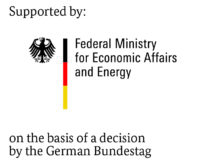Investigation of the effects on plastic components
In a current project, OWI Science4Fuels gGmbH and the Institute of Plastics Processing are investigating the compatibility of paraffinic fuels with plastics commonly used for tanks and fuel-carrying fittings of oil heating systems. In particular, the focus is on the effect in existing consumption plants for heating oil. The interaction with the tank materials polyethylene (PE) and polyamide (PA), with protective film made of polyvinyl chloride (PVC), with seals made of elastomers and with other polymers used in fittings is investigated. Paraffinic fuels are produced by hydrogenation of vegetable oils or synthetically from hydrogen and carbon dioxide. They have excellent combustion properties and very good storage stability.
The aim is to produce these fuels in a climate-neutral way, i.e. with energy that comes exclusively from renewable sources such as wind power and photovoltaics. Then a greenhouse gas reduction can be achieved by successively or completely replacing mineral oil-based heating oil with paraffinic fuels. However, it must first be ensured that the paraffinic fuels are fully compatible with the technology and components of oil heating systems. In marketed fuel oils, low sulfur, the content of aromatic hydrocarbons ranges from 23 to 39% by mass, while paraffinic fuels contain less than 1% aromatic hydrocarbons. These hydrocarbons are absorbed by some plastics without adverse consequences. It is not known what happens when pre-contaminated polymers come into contact with paraffinic fuels. The upcoming research project will investigate how paraffinic fuels, and in particular a switch from mineral oil-based fuel oil to paraffinic fuels, affect the stability of plastics. The investigations of possible effects of such switching include both pre-contaminated polymers from existing and new plants.
The findings obtained in the research project can be incorporated into the development activities of companies in the heating and component construction sector. In addition, they can be incorporated into the development of standardized test methods for demonstrating the resistance of the components of oil consumer systems to mixtures of middle distillates and synthetic paraffinic components.
The IGF project 21649 N of the research association German Society for Petroleum and Coal Science and Technology e.V. – DGMK, Überseering 40, 22297 Hamburg was funded through the AiF as part of the program for promoting joint industrial research (IGF) by the German Federal Ministry of Economics and Energy based on a German Federal Parliament resolution.

Link to the project profile






